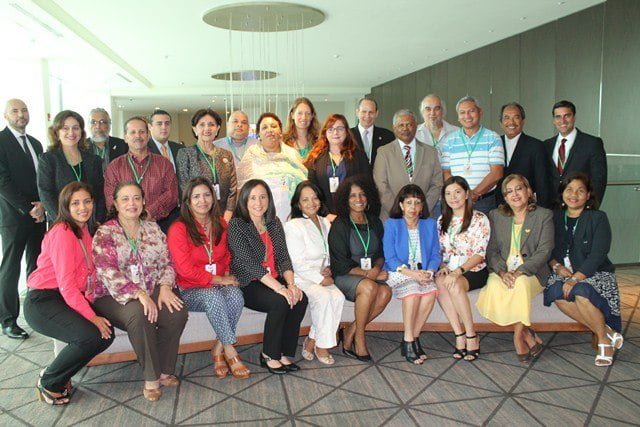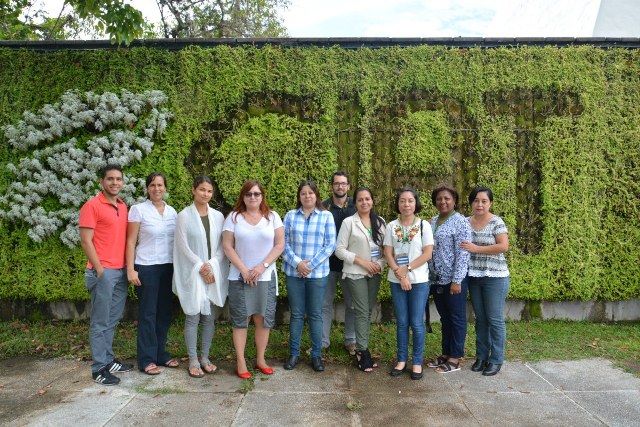Biofortification workshops strengthen work in Latin America and the Caribbean
Biofortification workshops strengthen work in Latin America and the Caribbean
In late September, strategies and alliances between the main people responsible for food biofortification in Latin America and the Caribbean were strengthened through two workshops held in the region. The first one (September 20- 22), which was promoted by the HarvestPlus program, gathered experts in communication and monitoring from Brazil, Colombia, El Salvador, Nicaragua, Honduras, Guatemala and Panama, in the International Center for Tropical Agriculture (CIAT), in Cali, Colombia. The following event, hosted in Panama, was organized by the country's Codex Alimentarius committee with the support of the Panama Institute of Agricultural Research (IDIAP, in Spanish), on September 27 and 28, and counted on the participation of the HarvestPlus itself, participating members of National Codex Alimentarius Committees from different countries (Brazil, Costa Rica, Cuba, El Salvador, Honduras, Mexico, Nicaragua and Panama), representatives from international organizations that support biofortification, the Inter-American Institute for Cooperation in Agriculture (IICA), the Food and Agriculture Organization of the United Nations (FAO) and Panamanian nutrition and agriculture institutions.
The meeting that took place in Colombia, according to the Deputy Coordinator of HarvestPlus Latin America and the Caribbean, Carolina González, strengthened "relations with partners and between partners.We have all learned from the experiences from other countries, which is very rewarding." There was leeway to share experiences and develop regional communication strategies to promote the use of biofortified crops in Latin America. At the same time, indicators and tools were established to manage and follow up on projects, identify obstacles and contribute to sharing the progress of the project with partners and donors.

The second workshop, entitled "Discussion of the Biofortification Strategy in Latin American and Caribbean Countries", prioritized experiences in the development of biofortified foods, following the guidelines of the Codex Alimentarius. For the Embrapa Food Technology researcher who is the coordinator of the HarvestPlus Latin America and the Caribbean, Marilia Nutti, the meeting was excellent, as it gave countries the opportunity to express their current concerns and strong points about biofortification. Ismael Camargo, the coordinator of the Panamanian biofortification program, AgroNutre Panama, considered the event was necessary for the progress of the joint work.

More about biofortification
Biofortification consists in a process of crossing plants of the same species to generate more nutritional cultivars. In Brazil, new varieties are obtained via conventional plant breeding, in which a plant is crossed with another one of the same species, and the incorporation of genes from other organisms to the plant genome does not occur; it is necessary to promote repeated crossings until the desired cultivar is obtained. It is only through transgenics or genetic engineering that genes from other organisms are incorporated into a plant's genome.
More about HarvestPlus
HarvestPlus works in global scale to improve nutritional security through the development and implementation of vitamin and mineral rich staple food products. Working with different partners in over 40 countries, HarvestPlus is part of CGIAR's Research Program on Agriculture for Nutrition and Health (A4NH). The Consortium of International Agricultural Research Centers (CGIAR) is a global agricultural research partnership aimed at a food-secure future. Its research is carried out by 15 research centers in close collaboration with hundreds of partners. The HarvestPlus program is coordinated by two of such partners.
Translation: Mariana de Lima Medeiros
Raphael Santos (MTb 35.303/RJ)
Embrapa Food Technology
Press inquiries
agroindustria-de-alimentos.imprensa@embrapa.br
Phone number: 21 36229739
Further information on the topic
Citizen Attention Service (SAC)
www.embrapa.br/contact-us/sac/
